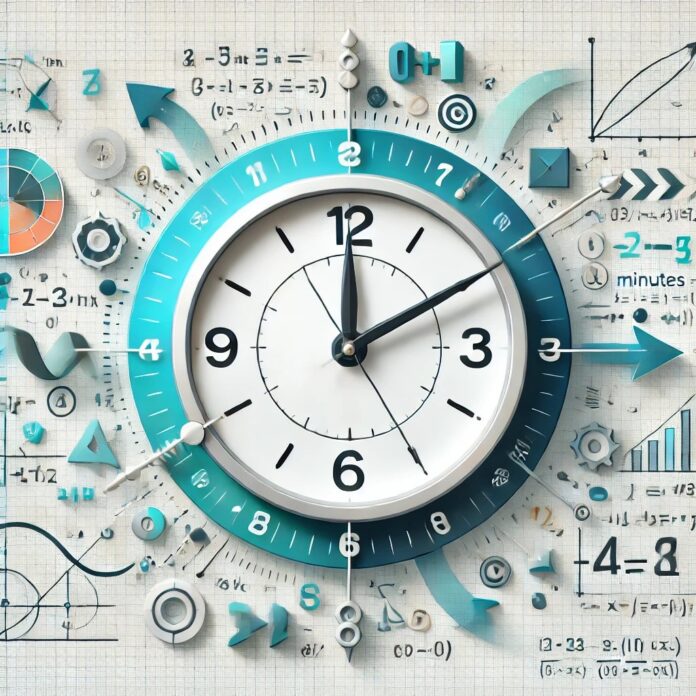Time is an essential part of our daily lives, and understanding how to measure and convert it is a crucial mathematical skill. One of the most common time-related conversions is transforming minutes into hours. Whether you’re solving math problems, managing your schedule, or tracking the time for an activity, knowing how to convert between these units is incredibly useful.
This guide will explain the concept of time measurement, the relationship between minutes and hours, and provide step-by-step methods for converting minutes into hours. We’ll also explore practical examples and tips to make these calculations easier.
Understanding the Basics of Time Measurement
What Are Minutes and Hours?
- Minutes: A minute is a unit of time that equals 60 seconds. It is commonly used to measure shorter durations.
- Hours: An hour is a larger unit of time consisting of 60 minutes. It is used to describe longer durations, such as the length of a class, a meeting, or a journey.
Time is structured in such a way that smaller units (seconds) fit into larger units (minutes and hours) in multiples of 60.
The Relationship Between Minutes and Hours
The key to converting minutes into hours lies in understanding their relationship:
- 1 hour = 60 minutes
- Therefore:
- 1 minute = 1/60 of an hour
To convert minutes to hours, divide the number of minutes by 60. This simple relationship serves as the foundation for all time conversions between these units.
How to Convert Minutes into Hours
Step-by-Step Conversion Method
- Understand the Total Number of Minutes
Start by identifying the number of minutes you need to convert. - Divide by 60
Since 1 hour equals 60 minutes, dividing the total minutes by 60 gives you the equivalent time in hours. Use the formula:
\(\text{Hours} = \frac{\text{Minutes}}{60}\) - Express the Result
Depending on the context, the result can be expressed as:- Decimal Hours: The result includes a fractional part (e.g., 2.5 hours).
- Mixed Units: Separate the fractional part into hours and minutes (e.g., 2 hours and 30 minutes).
Example 1: Converting 90 Minutes to Hours
- Total minutes = 90
- Divide by 60:
\(90 \div 60 = 1.5 , \text{hours}\) - Interpretation: 1.5 hours equals 1 hour and 30 minutes.
Example 2: Converting 45 Minutes to Hours
- Total minutes = 45
- Divide by 60:
\(45 \div 60 = 0.75 , \text{hours}\) - Interpretation: 0.75 hours equals 45 minutes.
Practical Applications of Minutes-to-Hours Conversion
In Daily Life
- Scheduling: You may need to calculate how many hours an activity will take if its duration is given in minutes.
- Example: A 150-minute movie lasts \(\frac{150}{60} = 2.5 , \text{hours}\), or 2 hours and 30 minutes.
- Travel Time: If a trip takes 135 minutes, convert it to hours to express it as 2 hours and 15 minutes.
In Academic Problems
- Math Problems: Conversions often appear in school problems involving speed, distance, or time.
- Example: If a car travels 300 km in 180 minutes, calculate the speed in km/h. First, convert 180 minutes to hours: \(\frac{180}{60} = 3 , \text{hours}\).
In the Workplace
- Billing and Time Management: Professionals often log work in minutes and convert it into hours for invoicing.
- Example: 120 minutes of work equals 2 hours.
Shortcuts and Tips for Faster Conversions
- Use Division for Exact Values Dividing by 60 always gives the exact result in decimal form.
- Memorize Common Conversions Familiarity with frequently used values can save time:
- 30 minutes = 0.5 hours
- 45 minutes = 0.75 hours
- 90 minutes = 1.5 hours
- Use Fractions for Simplicity When working with fractions, convert minutes to a fraction of an hour:
- \(15 , \text{minutes} = \frac{15}{60} = \frac{1}{4} , \text{hour}\)
- \(20 , \text{minutes} = \frac{20}{60} = \frac{1}{3} , \text{hour}\)
- Leverage Technology Use calculators, apps, or online tools for quick conversions when precision is essential.
Practice Problems
- Convert the following minutes into hours (express in decimal form):
- 75 minutes
- 200 minutes
- 50 minutes
- Convert the following minutes into hours and minutes (mixed units):
- 130 minutes
- 250 minutes
- 95 minutes
- Solve this real-world scenario:
A cyclist completes a 25-kilometer route in 110 minutes. What is their speed in kilometers per hour?
Answers to Practice Problems
- Decimal Hours:
- \(75 \div 60 = 1.25 , \text{hours}\)
- \(200 \div 60 = 3.33 , \text{hours}\)
- \(50 \div 60 = 0.83 , \text{hours}\)
- Mixed Units:
- \(130 \div 60 = 2 , \text{hours and} , 10 , \text{minutes}\)
- \(250 \div 60 = 4 , \text{hours and} , 10 , \text{minutes}\)
- \(95 \div 60 = 1 , \text{hour and} , 35 , \text{minutes}\)
- Cyclist Speed:
- Convert 110 minutes to hours: \(\frac{110}{60} = 1.83 , \text{hours}\)
- Speed = Distance ÷ Time: \(\frac{25 , \text{km}}{1.83 , \text{hours}} \approx 13.66 , \text{km/h}\)
Why Learning Time Conversions Is Important
Understanding how to convert minutes into hours is a fundamental skill that has applications in every aspect of life. From managing personal schedules to solving complex mathematical problems, this knowledge simplifies how we work with time. Moreover, mastering these conversions enhances problem-solving skills and fosters a deeper appreciation for the systems that govern our lives.
By practicing these methods and applying them in practical situations, anyone can gain confidence in managing and converting time effectively.

